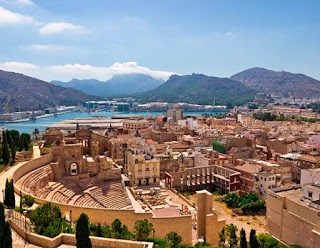"The role of the headteacher and the three levels of inclusion in Spanish schools "
by M. Domenica Torrombacco (Headteacher)
During the mobility period I was interested in the role of headteachers in Spanish schools.
As far as we have been told, the managing staff is recruited by the General Council formed by three religious and a laic, who make decisions about staff renewing every three years (to a maximum of nine years).
The Head-teacher is recruited through public concourse and the mission lasts four years at least. S/he is paid for thirty-one hours: beside the role of headteacher, s/he teaches a subject and manages learning, security and contacts with local institutions. The headteacher gets funds from the government and the University of Murcia, which sends trainees, and can employ external people if they provide interesting projects.
I was positively and negatively impressed by the different types of inclusion in Spanish schools. In
class I have noticed a focus on cooperation and citizenship; out of the class, more on language skills,
autonomy, self-control and management of frustration. I was positively interested in the system of “tailleres” for children with special needs, a sort of laboratories to reach personal outcomes. An example was that students wrote a shopping list, counted money, went shopping and then cooked a specific recipe. The older students with similar diseases prepared the labs for the younger ones.
What impressed me most was a different type of inclusion than in Italy. In Spain inclusion is fulfilled through three levels:
• special schools for students with hard diseases
• specific classes for special needs students for a few hours a week
• lessons in class with the other mates, a specific teacher for a few hours a week and other teachers of the school who complete their amount of hours.
by M. Domenica Torrombacco (Headteacher)
During the mobility period I was interested in the role of headteachers in Spanish schools.
As far as we have been told, the managing staff is recruited by the General Council formed by three religious and a laic, who make decisions about staff renewing every three years (to a maximum of nine years).
The Head-teacher is recruited through public concourse and the mission lasts four years at least. S/he is paid for thirty-one hours: beside the role of headteacher, s/he teaches a subject and manages learning, security and contacts with local institutions. The headteacher gets funds from the government and the University of Murcia, which sends trainees, and can employ external people if they provide interesting projects.
I was positively and negatively impressed by the different types of inclusion in Spanish schools. In
class I have noticed a focus on cooperation and citizenship; out of the class, more on language skills,
autonomy, self-control and management of frustration. I was positively interested in the system of “tailleres” for children with special needs, a sort of laboratories to reach personal outcomes. An example was that students wrote a shopping list, counted money, went shopping and then cooked a specific recipe. The older students with similar diseases prepared the labs for the younger ones.
What impressed me most was a different type of inclusion than in Italy. In Spain inclusion is fulfilled through three levels:
• special schools for students with hard diseases
• specific classes for special needs students for a few hours a week
• lessons in class with the other mates, a specific teacher for a few hours a week and other teachers of the school who complete their amount of hours.



Comments
Post a Comment